Out of the 325 winners of House of Representatives seats so far announced, only 14 women have secured seats in the Green Chamber. This piece examines the profiles of these female Members-Elect ahead of the 10th National Assembly.
READ ALSO: IWD: Meet the three female Senators-Elect in the 10th National Assembly
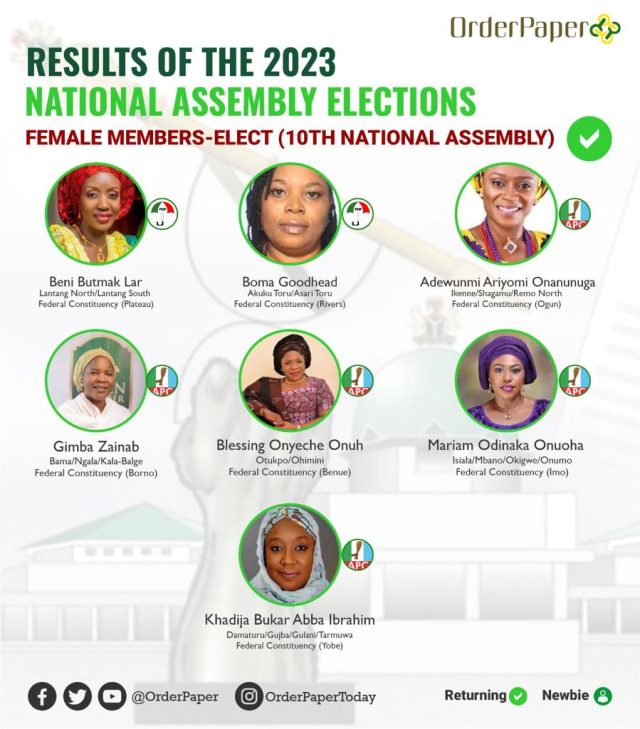
Editor’s Note:
As the world celebrates #IWD for another year, in embracing equity, inclusion and fairness, the question on the way forward for female representation in Nigeria is still unanswered.
Following the conclusion of the February 25 National Assembly elections, the attention of analysts has begun to turn to the representation of various demographics in parliament, especially as it affects women. While the House of Representatives have, for years since the return of the National Assembly in 1999, continued to blaze the trail in terms of women’s representation in parliament, the composition of the House in the incoming tenth Assembly has become a talking point.
Going down memory lane, the Fourth Republic, which ushered in the 4th House, had 11 women within its ranks, representing 3.06% of the total members of the House of Representatives. In the 5th House, women’s representation in the Green Chamber moved to 21 out of 360 lawmakers representing 5.83% of its membership. This, however, witnessed an all-time high in the 6th House, as 27 of the 360 lawmakers elected to the legislative chamber were women. This represented 7.5% of its membership.
A somewhat steady decline started in the 7th House, dropping from 27 to 22, which meant only 6.11% of the House membership were women in both the 7th and 8th Assemblies. However, the decline became more evident by the 9th Assembly, as it dropped from 22 to 13, implying that only 3.61% of the current House members were women.
Ahead of the 10th Assembly, only 7 of the 13 incumbent female members will return, but seven new women were elected. Although this will be the highest since the 8th Assembly, development analysts say is still a far cry from the average in terms of women’s representation, particularly in the 21st century. There are also arguments that these numbers are not in tandem with the vision of 35 per cent affirmative action for women in leadership positions as declared by the United Nations.
With the current arrangement, the APC leads other parties in terms of female representation at the House of Representatives as it boasts of seven women who won election on its platform. The other seven are apparently split across the All Progressives Grand Alliance (APGA), the Peoples’ Democratic Party (PDP), Labour Party (LP) and Young Progressives Party (YPP).
READ ALSO: 92% of Female Reps sponsored one bill or more | National Assembly Scorecard
Here’s a profile of the fourteen female Members-Elect:
INCUMBENTS
- Beni Butmak Lar (Lantang North/Langtang South Federal Constituency)
The eldest daughter of a former Plateau Governor, Solomon Lar, has been a member of the House since 2007. She chairs the House Committee on Science and Technology and has sponsored nine bills in the last three years (June 2019 – May 2022).Rep. Lar defeated a former Minister of Youth and Sports Development, Solomon Dalung of the Social Democratic Party (SDP), to secure a record fifth term. - Boma Goodhead (Akuku Toru/Asari Toru Federal Constituency)
A member of the Peoples’ Democratic Party (PDP) in Rivers State, Rep. Goodhead is a very vibrant lawmaker passionate about issues of the Niger Delta Region.
She is, however, one of the three lawmakers from Rivers State in the House of Representatives that sponsored zero bills between June 2019 and May 2022. - Adewumi Oriyomi Onanuga (Ikenne/Shagamu/Remo North Federal Constituency)
The first-term lawmaker chairs the House Committee on Women’s Affairs and Social Development. A member of the All Progressives Congress (APC) and lone female federal lawmaker in Ogun State.She sponsored four bills between June 2019 and May 2022. - Zainab Gimba (Bama/Ngala/Kala-Balge Federal Constituency)
A first-term lawmaker from Borno State. She was first elected to the House in 2019 on the platform of the All Progressives Congress (APC) and has three bills to her name.
.Rep. Gimba is Vice Chairman of the House Committee on Sustainable Development Goals (SDGs) and had served as Commissioner in three key ministries in Borno State, including that of poverty allegation, before moving to the House. - Blessing Onyeche Onuh (Otukpo/Ohimini Federal Constituency)
The daughter of a former Senate President, David Mark, was first elected to the federal parliament in 2019 on the All Progressives Grand Alliance (APGA) platform. The Benue lawmaker later switched to the All Progressives Congress (APC), where she secured re-election.She currently serves as Deputy Chairperson of the House Committee on the Federal Capital Territory (FCT) and has two bills to her credit. - Mariam Odinaka Onuoha (Isiala/Mbano/Okigwe/Onumo Federal Constituency)
An Imo lawmaker with nine bills to her name in the last three years, she secured a third-term re-election victory on February 25.Before her election to the House, she was Senior Special Assistant to the Governor of Bayelsa State on International Engagement and Development Cooperation. - Khadija Bukar Abba Ibrahim (Gujba/Gulani/Damaturu/Tarmuwa Federal Constituency)
A member of the All Progressives Congress (APC), the only female lawmaker from Yobe State has been in the federal parliament since 2007.She had previously been First Lady of the State, being the wife of Governor Bukar Abba Ibrahim. She later served as Minister of State for Foreign Affairs during President Buhari’s first term before her return to the House in 2019 and re-election in 2023.She is currently the Chairman of the House Committee on the North East Development Commission (NEDC) and has sponsored just one bill in the period under review.
READ ALSO: 24 years after, women’s representation at National Assembly stands at 3.62%
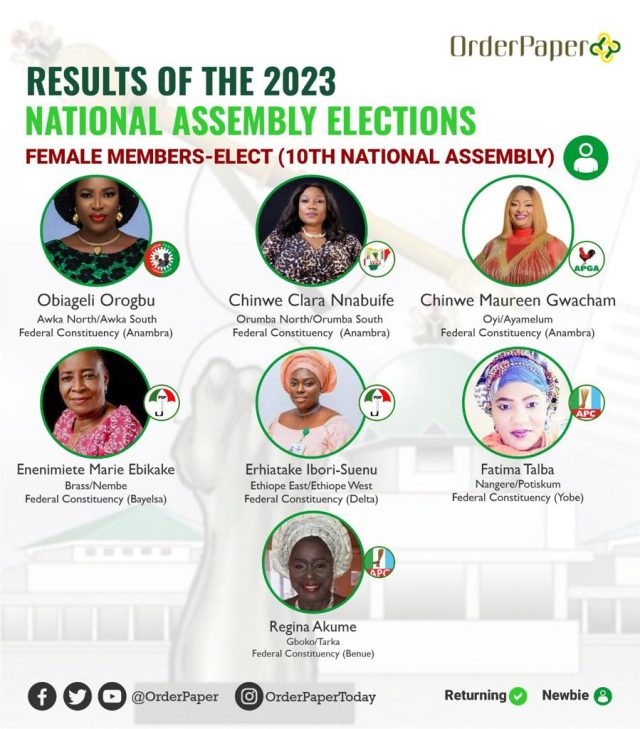
List of new Female Members elected into the 10th House of Representatives - Regina Akume
A former First Lady of Benue State, she is wife to the present Minister for Special Duties, George Akume. She is a member of the All Progressives Congress (APC), on which platform she won elections to the House. - Erhiatake Ibori-Suenu (Ethiope East/West Federal Constituency)
A serving member of the Delta State House of Assembly, she is the daughter of a former Delta State Governor, James Ibori. She won the elections on the platform of the People’s Democratic Party (PDP). - Fatima Talba (Nangere/Potiskum Federal Constituency)
A member of the All Progressives Congress (APC) in Yobe State. The newly elected lawmaker is a journalist. - Enenimete Mary Ebikake (Brass/Nembe Federal Constituency)
A member of the People’s Democratic Party (PDP) in Bayelsa State. She previously served as Chairperson of Brass Local Government Area in Bayelsa State; the first woman in the state to attain that height. - Obiageli Orogbu (Awka North/Awka South Federal Constituency)
A member of the Labour Party (LP) in Anambra State. The newly elected lawmaker rose to the rank of a scholar at the Nnamdi Azikiwe University, Awka, before her entrance into politics. - Chinwe Clara Nnabuife (Orumba North/Orumba South Federal Constituency)
A member of the Young Progressives Party.(YPP) in Anambra State. She has been in the private sector before her current endeavour, where she manages a property development outfit. - Maureen Chinwe Gwacham (Oyi/Ayamaelum Federal Constituency)
A member of the All Progressives Grand Alliance (APGA) in Anambra State. Before joining politics, she had been a Consultant to a number of government institutions on policy and planning and has been a successful businesswoman.
READ ALSO: IWD: Why no incumbent female Senator will return to the National Assembly
| PARTY | MEMBERS-ELECT
(10TH ASSEMBLY) |
TOTAL FEMALE LAWMAKERS (IN WAITING)
AT 10TH NASS
|
| All Progressives Congress (APC) | 7 | 8 |
| Peoples’ Democratic Party (PDP) | 4 | 5 |
| Labour Party (LP) | 1 | 2 |
| All Progressives Grand Alliance (APGA) | 1 | 1 |
| Young Progressives Party (YPP) | 1 | 1 |
| Total | 14 | 17 |
Note: The Nigerian House of Representatives is constitutionally composed of 360 members. The Independent National Electoral Commission (INEC) is however, yet to conduct elections into 35 Federal Constituencies.

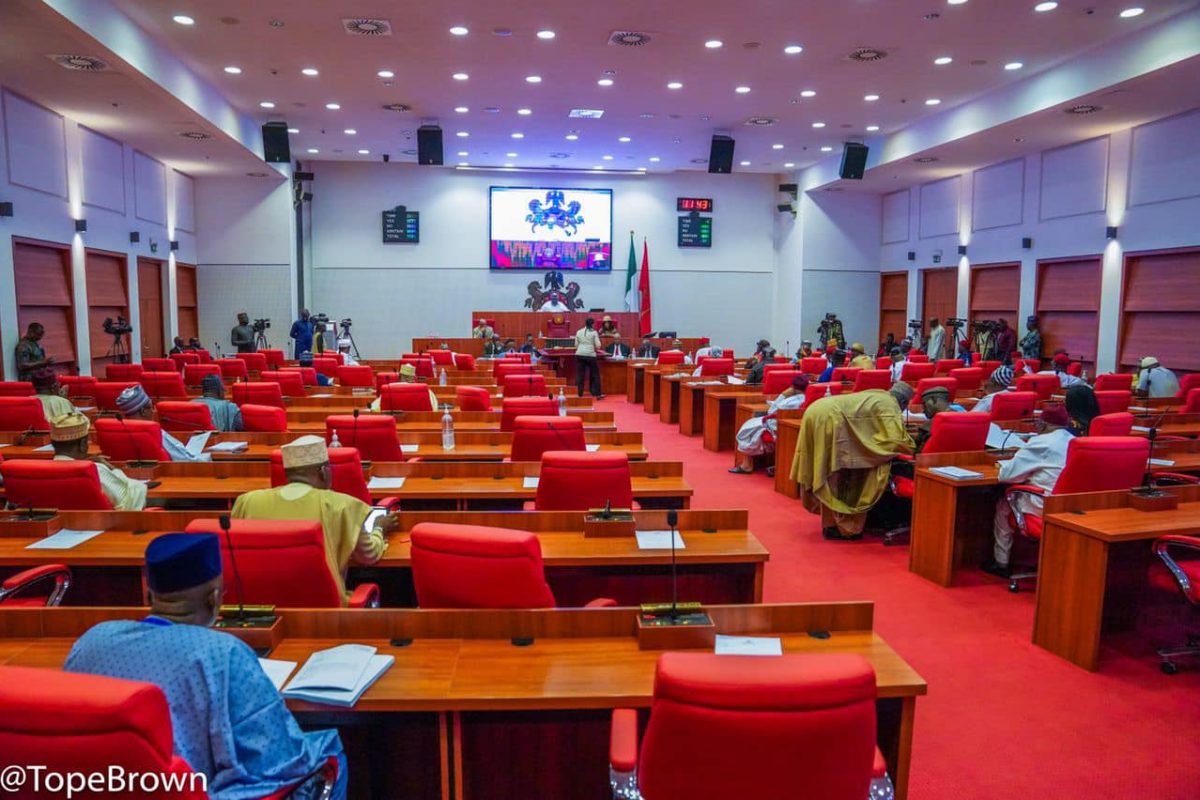
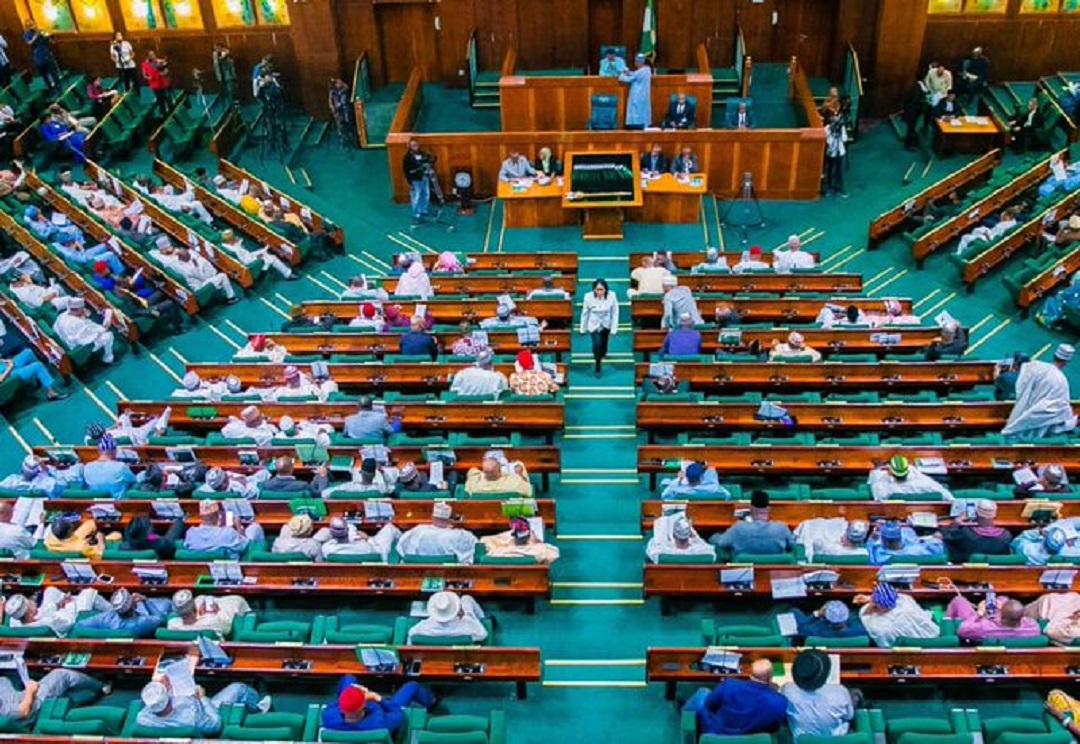
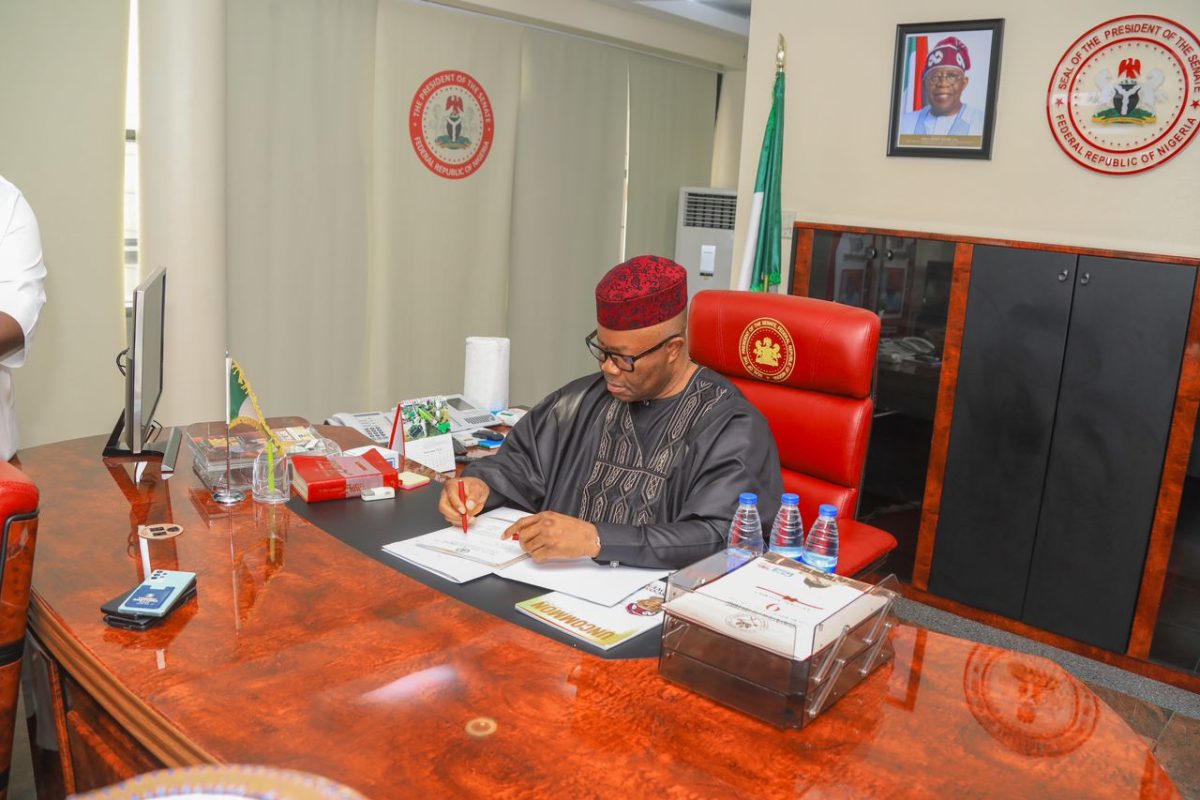
2 comments
Samaila Ayuba Laslimbo
March 10, 2023 at 5:26 pm
The level of involvement of women in the NASS is still law per number, but how I wish they use the opportunity to show that women are full of capacity and capabilities so that we can at least have 35% representation of women
Aladeokomo Babatunde
March 11, 2023 at 11:48 am
It seems as if both former Governors and former First-Ladies has seen the national assembly as a place of rest. It is annoying to see that majority of these women elected to represent at the 10th assembly are either former First-Lady or daughter of former Governor or Former Legislator. If we don’t break this jinx, and we allow this trend to continue, the trend may self truncate itself in a deadly manner or the trend may consume the whole nation. We may end up having an informal cast system.
Take for instance someone like Hon. Khadija Abba Ibrahim has been in the national assembly since 2007, a former First-Lady, former Minister, married to a former long serving Senator, contested one time with her step son. One may think they worked to be there but it is a dynasty web that can’t help our democracy.
In terms of the decline in numbers of female legislators I want to question the increasing good numbers of female electorates what is their gender equality campaign all about? Is it a social media rant? Or what about the women helping women thing? If they can’t stand for their own, no one will ever give them the 35percent affirmative on the platter of gold. Women should be more organized and be ready to trust their selves more in order to be visibly represented in all national stage.